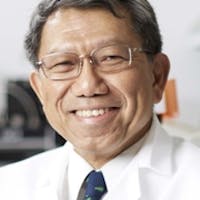
Rocky S. Tuan, PhD
Professor, Director
Bio
Director, Center for Cellular and Molecular Engineering. Arthur J. Rooney, Sr. Chair Professor of Sports Medicine. Executive Vice Chairman, Department of Orthopaedic Surgery. Associate Director, McGowan Institute for Regenerative Medicine. Director, Center for Military Medicine Research. Professor, Departments of Bioengineering. and Mechanical Engineering & Materials Science. University of Pittsburgh, Pittsburgh, Pennsylvania. Rocky S. Tuan, PhD, received his PhD in 1977 from the Rockefeller University in New York, under the mentorship of Zanvil A. Cohn, MD. His postdoctoral research fellowship was at Harvard Medical School in Boston, first with Melvin J. Glimcher, MD in the Department of Orthopaedic Surgery at the Children's Hospital, and then from 1978 to 1980 with Jerome Gross, MD, in the Developmental Biology Laboratory at the Massachusetts General Hospital. In 1980, Dr. Tuan was appointed as Assistant Professor in the Department of Biology, University of Pennsylvania in Philadelphia, and was promoted to Associate Professor in 1986. In 1988, Dr. Tuan joined Thomas Jefferson University, Philadelphia, to be the Director of Orthopaedic Research and Professor and Vice Chairman in the Department of Orthopaedic Surgery with a joint appointment in the Department of Biochemistry and Molecular Biology. From 1992-1995, Dr. Tuan was the Academic Director of the MD/PhD program at Jefferson, and in 1997, he established the nation’s first Cell and Tissue Engineering PhD program at Jefferson, with the mission of training the next generation of "cross-cultural" biomedical scientists committed to regenerative medicine and the development of functional tissue substitutes. In the fall of 2001, Dr. Tuan joined the Intramural Research Program of the National Institute of Arthritis, and Musculoskeletal and Skin Diseases (NIAMS), National Institutes of Health (NIH), as Chief of the newly created Cartilage Biology and Orthopaedics Branch. In 2004, Dr. Tuan received the Marshall Urist Award for Excellence in Tissue Regeneration Research of the Orthopaedic Research Society. In the Fall of 2009, Dr. Tuan was recruited by the University of Pittsburgh School of Medicine to be the Founding Director of the Center for Cellular and Molecular Engineering, and as Arthur J. Rooney, Sr Chair Professor and Executive Vice Chairman of the Department of Orthopaedic Surgery, with a joint appointment as Professor in the Department of Bioengineering. Dr. Tuan is currently Co-Director of the Armed Forces Institute of Regenerative Medicine, a U.S. Department of Defense funded, national, multi-institutional consortium focused on developing translational regenerative therapies for battlefield injuries. Two recent appointments include (1) Associate Director of the McGowan Institute for Regenerative Medicine, and (2) Founding Director of the Center for Military Medicine, both at the University of Pittsburgh. At the University of Pittsburgh, he was appointed Distinguished Professor of Orthopaedic Surgery in 2014, and received the Chancellor’s Distinguished Research Award in 2015. Dr. Tuan has published over 450 research papers, has lectured extensively, and is currently Editor of the developmental biology journal, BDRC: EMBRYO TODAY, and Founding Editor of STEM CELL RESEARCH AND THERAPY. Dr. Tuan directs a multidisciplinary research program, which focuses on orthopaedic research as a study of the biological activities that are important for the development, growth, function, and health of musculoskeletal tissues, and the translation of this knowledge to develop technologies that will regenerate and/or restore function to diseased and damaged skeletal tissues, particularly related to trauma and injuries. Ongoing research projects are directed towards multiple aspects of skeletal and related biology, including skeletal development, stem cells, growth factor signaling, bone-biomaterial interaction, extracellular matrix and cell-matrix interaction, nanotechnology, biomaterials, 3D printing, mechanobiology, regenerative medicine, and tissue engineering, utilizing an integrated experimental approach combining contemporary technologies of biochemistry, cell and molecular biology, embryology and development, cellular imaging, and engineering.










